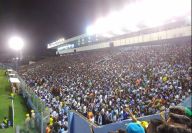Paysandu Sport Club, or Paysandu, as they are usually called, is a Brazilian football team from Belem in Para, founded on February 2, 1914.
History
On February 2, 1914, members of Norte Club protested against a decision of the football federation of Para benefiting Remo by terminating the team and refounding other team. Unanimously, the assembly chose Hugo Leao to chair the meeting. As leader of the movement, he proposed the name of Paysandu Foot-Ball Club for the new club. The name was chosen as a tribute to the unfortunate event in Paysandu, a Uruguayan city, which would take the start of the war against Paraguay.
That year, the Norte Club held a good campaign and needed to beat Guarany to force an extra match against Grupo do Remo. After the tie at 1–1, the members of the Norte Club, unreconstructed, asked the Para's Foot-Ball League the cancellation of the match due to various irregularities. However, the board of the Para's Foot-Ball League dismissed the appeal.
The decision did not like it one bit to the members of the Norte Club, which then decided to create a movement, under the leadership of Hugo Leao, to the foundation of a new association, stronger, to be able to meet on equal terms their opponents. This movement did not like the members of Grupo do Remo, who tried to persuade Hugo Leao to abandon the idea.
In February 1914, the newspaper O Estado do Para made the call for the meeting of a new club. The call by the newspaper had an effect, causing those who attended the meeting 42 athletes, many of whom had built the Norte Club, in addition to other different associations. Chosen the name, the assembly elected the first president, Deodoro de Mendonca, who headed the board during the year 1914. It was also chosen the committee to draft the Statutes of the Club, relapsing choosing the names of Mendonca Deodoro, Eurico Amanajas and Arnaldo Morais. To write the status of the club assembly chose the following commission: Deodoro de Mendonca, Eurico Amanajas and Ar
This page also has a version in other languages : Пайсанду (Белен) (russian)

